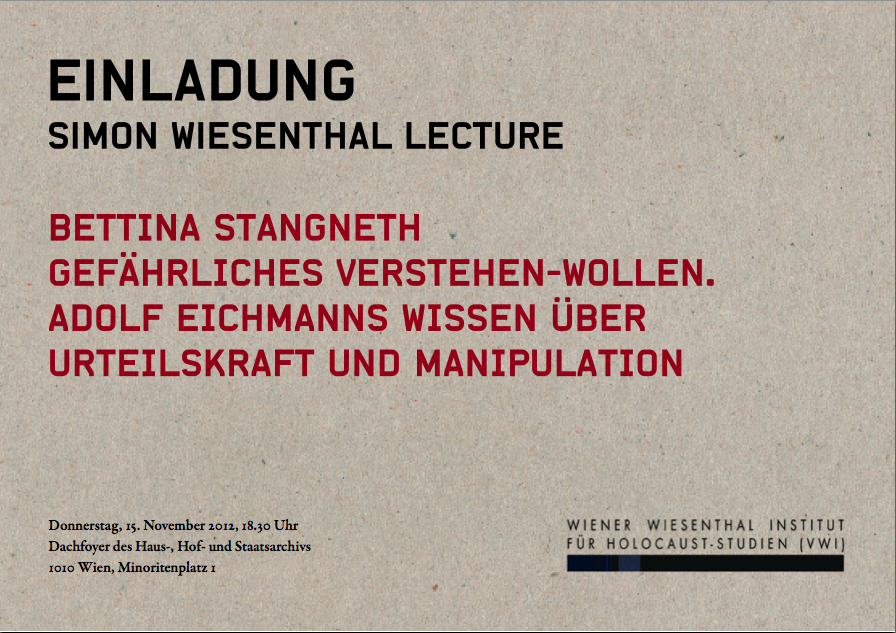Simon Wiesenthal Lectures
The Simon Wiesenthal lecture series takes place regularly every six to eight weeks and aims to present the latest research findings on the Holocaust to both a professional and a broader audience. They take into account the impressive spectrum of this discipline, the numerous questions and issues from empirical-analytical historiography to topics of cultural studies and involve young scholars as well as established academics.
Since 2007, when the Vienna Wiesenthal Institute for Holocaust Studies (VWI) was still being established, the lecture series – at that time in cooperation with the Documentation Centre of Austrian Resistance (DÖW) and the Institute of Contemporary History at the University of Vienna– has developed into the flagship of the VWI's outreach activities as a supporting element in the communication of recent academic findings in the field of Holocaust research and Holocaust and genocide studies.
For over a decade, the Austrian State Archives generously offered shelter to the Simon Wiesenthal Lectures in the roof foyer of the Haus-, Hof- und Staatsarchiv. During the challenging years of the pandemic, the lectures were held online. From autumn 2022, in order to reach out to further audiences, a new cooperation partner was found in the Wien Museum. Until the reopening of the main location at Karlsplatz, the SWL will take place at MUSA, Felderstraße 6-8, next to the Vienna City Hall.
| Simon Wiesenthal Lecture | |||
| Bettina Stangneth: Gefährliches Verstehen-Wollen. Adolf Eichmanns Wissen über Urteilskraft und Manipulation | |||
Thursday, 15. November 2012, 18:30 Dachfoyer des Haus-, Hof- und Staatsarchivs, Minoritenplatz 1, 1010 Wien
|
|||
Seit die Welt vom Massenmord an den europäischen Juden und Jüdinnen weiß, stellt sich die Frage, wie es dazu kommen konnte. Wie war es möglich, Millionen von Menschen aus ihrem Lebenszusammenhang zu reißen, »in den Osten« zu deportieren und dort zu ermorden. Einer, der maßgeblich den Massenmord organisiert hatte, war Otto Adolf Eichmann. In der NS-Zeit machte er als »Spezialist für Judenfragen« Karriere, weil niemand so effektiv Vertreibung, Verfolgung und Ermordung realisieren konnte wie er. Das Interesse an diesem Mann war entsprechend groß, als man ihm 1961 in Israel den Prozess machte. Der Eindruck, den Eichmann in Jerusalem auf die Prozessbeobachter und -beobachterinnen machte, wollte dennoch nicht zu seiner mörderischen Laufbahn passen. Konnte jemand, der so harmlos wirkte, tatsächlich so gefährlich gewesen sein? Aber Adolf Eichmann wusste nicht nur, wie man Deportationen organisiert; er wusste vor allem, wie man Opfer organisiert. Denn Menschen zu manipulieren – das gelang ihm zu allen Zeiten, sogar noch als Angeklagter vor Gericht. Das ist der Grund, warum wir danach fragen müssen, was dieser Menschheitsverbrecher über die menschliche Urteilskraft und die Möglichkeit wusste, uns diese Kraft zu nehmen, ja mehr noch, sogar unseren Wunsch zu Verstehen gegen uns zu verwenden.
Bettina Stangneth, Philosophin, promovierte über das Radikal Böse bei Immanuel Kant, gab Kants Religionsschrift kommentiert heraus und arbeitete zum Antisemitismus im 18. Jahrhundert und zur Philosophie im Nationalsozialismus. Seitdem forscht Stangneth zur Lügentheorie. 2011 erschien Eichmann vor Jerusalem, 2012 folgte mit Lüge! Alles Lüge! die Rekonstruktion der Aufzeichnungen des Eichmann-Verhörers Avner Werner Less. Zur Zeit arbeitet Stangneth u.a. an der historisch- kritischen Neuausgabe von Hannah Arendts Eichmann in Jerusalem.
|
|||












